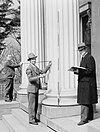File:CHINESE PLAT, 1919 (L19 19 4 E, SALT LAKE CITY CEMETERY LOCATER), SALT LAKE CITY, UT. VIEW LOOKING NORTHEAST AT CHINESE PLAT MARKER, BURNER and CHINESE GRAVES. - Salt Lake City Cemetery, HALS UT-2-11.tif

Original file (4,942 × 3,677 pixels, file size: 17.33 MB, MIME type: image/tiff)
Captions
Captions
Summary edit
| CHINESE PLAT, 1919 (L19 19 4 E, SALT LAKE CITY CEMETERY LOCATER), SALT LAKE CITY, UT. VIEW LOOKING NORTHEAST AT CHINESE PLAT MARKER, BURNER and CHINESE GRAVES. - Salt Lake City Cemetery, 200 N Street, Salt Lake City, Salt Lake County, UT | |||||
|---|---|---|---|---|---|
| Photographer |
Goss, Peter L. |
||||
| Title |
CHINESE PLAT, 1919 (L19 19 4 E, SALT LAKE CITY CEMETERY LOCATER), SALT LAKE CITY, UT. VIEW LOOKING NORTHEAST AT CHINESE PLAT MARKER, BURNER and CHINESE GRAVES. - Salt Lake City Cemetery, 200 N Street, Salt Lake City, Salt Lake County, UT |
||||
| Depicted place | Utah; Salt Lake County; Salt Lake City | ||||
| Date | 2007 | ||||
| Dimensions | 5 x 7 in. | ||||
| Current location |
Library of Congress Prints and Photographs Division Washington, D.C. 20540 USA http://hdl.loc.gov/loc.pnp/pp.print |
||||
| Accession number |
HALS UT-2-11 |
||||
| Credit line |
|
||||
| Notes |
The cemetery is a cherished public park in the great tradition of the American rural cemetery and public park movement. Early 20th century photos from the Shipler Collection show extensive understory plantings of shrubs and elaborate flower beds. As was common practice in other Salt Lake City parks, the cemetery once had its own greenhouse for the production of bedding plants. Today the vegetation consists primarily of a mixed forest of evergreen and deciduous trees and expansive lawns. The cemetery houses a diverse population of birds and wildlife including raptors, songbirds, deer, squirrels, chipmunks, and occasional mountain lions.
|
||||
| Source | https://www.loc.gov/pictures/item/ut0699.photos.365060p | ||||
| Permission (Reusing this file) |
|
||||
File history
Click on a date/time to view the file as it appeared at that time.
| Date/Time | Thumbnail | Dimensions | User | Comment | |
|---|---|---|---|---|---|
| current | 03:20, 4 August 2014 |  | 4,942 × 3,677 (17.33 MB) | Fæ (talk | contribs) | GWToolset: Creating mediafile for Fæ. HABS 2014-08-02 (3401:3600) |
You cannot overwrite this file.
File usage on Commons
The following page uses this file:
Metadata
This file contains additional information such as Exif metadata which may have been added by the digital camera, scanner, or software program used to create or digitize it. If the file has been modified from its original state, some details such as the timestamp may not fully reflect those of the original file. The timestamp is only as accurate as the clock in the camera, and it may be completely wrong.
| Camera manufacturer | Sinar |
|---|---|
| Camera model | 54H |
| Author | Library of Congress |
| Width | 4,942 px |
| Height | 3,677 px |
| Compression scheme | Uncompressed |
| Pixel composition | Black and white (Black is 0) |
| Orientation | Normal |
| Number of components | 1 |
| Number of rows per strip | 13 |
| Horizontal resolution | 700 dpi |
| Vertical resolution | 700 dpi |
| Data arrangement | chunky format |
| Software used | Stokes Software Inc. IWS - Version 03.03.01.09 |
| File change date and time | 10:38, 1 December 2009 |

